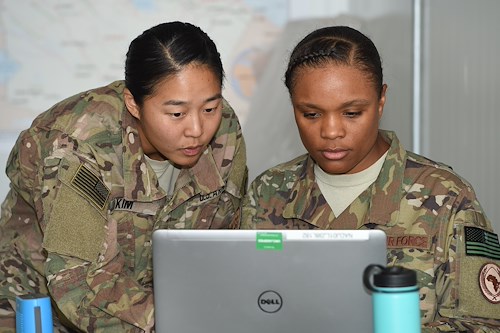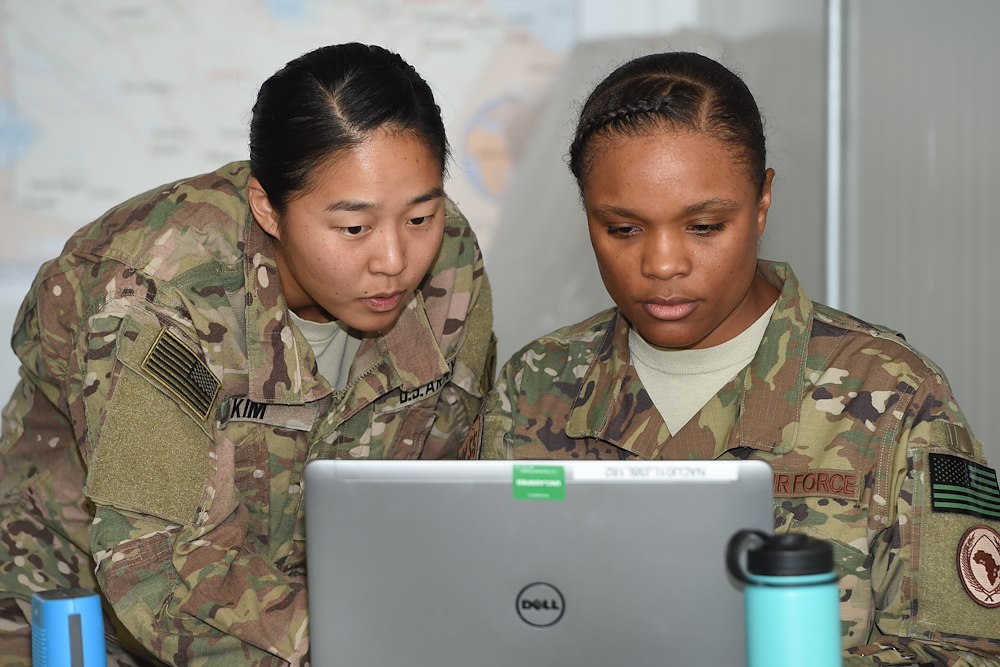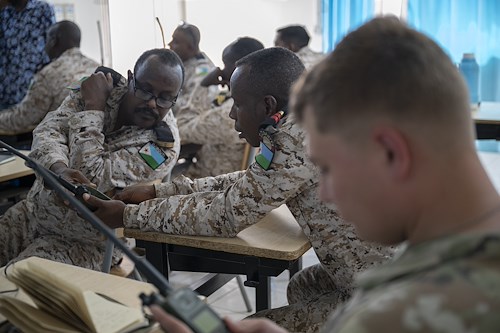Gallery contains 5 images
×
Photo 1 of 5
A joint approach to field sanitation
U.S. Army 1st Lt. Elizabeth Kim, officer in charge of environmental health for Camp Lemonnier, confers with U.S. Air Force Tech. Sgt. Pauline Jones, noncommissioned officer in charge of preventative medicine, during a Field Sanitation Team Training course at Camp Lemonnier, Djibouti, Feb. 14, 2017. As course instructors, Kim and Jones taught participating service members field sanitation practices proven to mitigate disease and non-battle related injuries. (U.S. Air National Guard photo by Master Sgt. Paul Gorman)
Photo by: Master Sgt. Paul Gorman
Photo 2 of 5
A joint approach to field sanitation
U.S. Marine Corps Sgt. Joaquin Crisostomo and U.S. Army Staff Sgt. Richard Caramico, receive classroom instruction on the use of a wet bulb-globe temperature kit during a Field Sanitation Team Training course at Camp Lemonnier, Djibouti, Feb. 14, 2017. The course was conducted by members of the Combined Joint Task Force-Horn of Africa surgeon cell, and included such topics as water purification, heat and cold injuries, pest management and preventative medicine measures while in field conditions. (U.S. Air National Guard photo by Master Sgt. Paul Gorman)
Photo by: Master Sgt. Paul Gorman
Photo 3 of 5
A joint approach to field sanitation
U.S. Army Sgt. Nicholas Lapenna, left, U.S. Navy Logistics Specialist 2nd Class Amy Neece and U.S. Army Spc. David Deherrera learn the chlorination process required to create potable water during a Field Sanitation Team Training course at Camp Lemonnier, Djibouti, Feb. 14, 2017. The course was conducted by members of the Combined Joint Task Force-Horn of Africa surgeon cell, and included water purification methods, pest management, hot and cold weather injury prevention, proper waste disposal and preventative medicine measures while in field conditions. (U.S. Air National Guard photo by Master Sgt. Paul Gorman)
Photo by: Master Sgt. Paul Gorman
Photo 4 of 5
A joint approach to field sanitation
Students in the February 13, 2017 Field Sanitation Team Training (FSTT) course at Camp Lemonnier, Djibouti, learn the proper use of a wet bulb-globe temperature kit in order to determine the appropriate hydration requirements and work-rest cycle for troops operating in high temperatures. Injuries such as heat cramps, heat exhaustion and heat stroke are a serious threat to military personnel operating in warm climates, and one of many topics covered by the FSTT course in order to mitigate disease and non-battle related injuries. (U.S. Air National Guard photo by Master Sgt. Paul Gorman)
Photo by: Master Sgt. Paul Gorman
Photo 5 of 5
A joint approach to field sanitation
U.S. and French military members demonstrate their ability to use a wet bulb-globe temperature (WBGT) kit during a Field Sanitation Team Training course at Camp Lemonnier, Djibouti, Feb. 14, 2017. The WBGT kit is an instrument for providing information on hot weather risks to the health of troops undergoing training. (U.S. Air National Guard photo by Master Sgt. Paul Gorman) (Foreign service members name tape has been obscured for OPSEC)
Photo by: Master Sgt. Paul Gorman
DJIBOUTI - Soldiers, Sailors, Airmen and Marines gathered to take part in a week-long Field Sanitation Team Training (FSTT) course at Camp Lemonnier, Feb. 13-17, 2017.
The concept of the field sanitation team was first established in the U.S. Army during World War II as a means to control malaria. Today, the practice has expanded to include a wide variety of field sanitation practices proven to mitigate disease and non-battle related injuries.
Training in areas such as water purification, pest management, hot and cold weather injury prevention and proper waste disposal help to improve the general health and welfare of military personnel, thus increasing mission accomplishment.
February’s FSTT was the first attended by military members from every service branch operating at Camp Lemonnier. It was also the first to include a partner nation representative with the participation of a French military member.
U.S. Air Force Technical Sgt. Pauline Jones, preventative medicine technician with the Combined Joint Task Force-Horn of Africa surgeon cell and FSTT course instructor, considered the diversity to be beneficial to everyone involved.
“I learned so much from the different [military] branches, and in this case from our foreign counterpart as well,” said Jones. “Although the type of conditions we are exposed to may vary, at the end of the day our mission is the same.”
Though not exposed to field sanitation in her normal duties, U.S. Navy Logistics Specialist 2nd Class Amy Neece, budget analyst for Camp Lemonnier, expressed great interest in learning how other branches sustain themselves in a non-traditional environment.
“I had no idea how much planning is involved in field sanitation,” Neece said. “The amount of work that occurs behind the scenes to make even common tasks like using the latrine, or taking a shower possible is amazing.”
The FSTT course culminated with an exam covering the various topics presented during the week. Upon passing the exam, students were presented with a certificate signifying their completion of the course. Participating Soldiers were also awarded points toward their promotion because of the U.S. Army’s requirement for trained field sanitation teams.
According to Jones, whether a service member attends for promotion points, or simply for self-improvement, the knowledge alone is a significant force multiplier.
“When it comes to sanitation and health, just knowing what to do and how to do it can benefit anyone and everyone.” Jones said.
Jones intends to continue regular joint FSTT courses throughout her deployment, and into future deployment rotations through the preventative medicine technicians assigned to Camp Lemonnier.




















